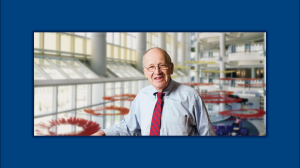A Humble Giant with Broad Shoulders
Samuel L. Katz, MD, described himself as merely a “young, enthusiastic, and naïve pediatrician” who “came along at the right time, in the right laboratory, with the right colleagues.” This is a remarkably humble reframing of the accomplishments of the pioneering virologist, pediatrician, and chairman emeritus and Wilburt C. Davison Professor Emeritus of Pediatrics at Duke University School of Medicine.
Katz graduated from Harvard Medical School and pursued a pediatrics residency at Massachusetts General Hospital and Boston Children’s. In 1955, a polio epidemic struck Boston. As a third-year resident at the time, Katz was deeply affected by the patients he saw suffering from the disease. He knew then that he wanted to study viruses.
His department chairman, Charles Janeway, MD, suggested he reach out to John Enders, PhD, who had recently won the Nobel Prize for his work with polio. Enders’s lab was across the street, and a brief conversation between the two turned into a mentorship and a fellowship opportunity. Katz spent the next 12 years researching viruses—specifically measles, a disease that at the time killed more than five to six million children each year globally.
“John Enders was a super mentor whose example I was pleased to emulate,” says Katz. “He took only three or four [fellows] because he wanted to spend time with them. He made daily rounds, asking each, ‘What’s new?’ There was a great incentive to develop something new, because then he’d sit and talk for about an hour and give you great ideas about how to further the progress with what you were doing.”
Katz ultimately cultured and propagated an attenuated measles virus strain, and in 1960, David Morley, MD, a British physician working in Nigeria, where the effects of measles were far more severe than they were in the United States, contacted Katz. Together, they vaccinated Nigerian children with successful results. Not long after, the vaccine was tested in national clinical trials and was approved by the Food and Drug Administration in 1963.
“The virus wasn’t any more virulent in Nigeria than in the United States, but the hosts were different,” Katz says. “It was the innocent child who had all of these underlying issues that allowed measles to cause so much more harm.”
In 1968, Katz was appointed chair of pediatrics at Duke Children’s. Throughout his tenure he conveyed the same genuine interest in his patients and his faculty as Enders had in him, actively encouraging female and minority physicians and seeking to diversify the faculty.
“Sam Katz is a hero among heroes,” says Brenda Armstrong, AB’70, MD, HS’75-’79, a senior associate dean at Duke University School of Medicine, and a former student and mentee of Katz. “He exemplifies the unbridled love of children and people in how he has devoted his life to others. He has left a part of himself in all of us who have been so blessed by his enormous intellect, humanism, compassion, grace, and humility.”
In addition to seeing patients and supporting faculty, Katz expanded his role as an advocate for vaccination. Experiencing first-hand the ways in which disease impacts children living in resource-poor countries contributed to Katz’s lifelong advocacy, within the United States and around the world. He chaired the American Academy of Pediatrics Committee on Infectious Diseases for six years, served as member and chair of the Centers for Disease Control and Prevention Advisory Committee on Immunizations Practices, and has worked on behalf of UNICEF, the World Health Organization, and the American Red Cross.
“You put me in a position of more grandeur than I really enjoy, I am enormously gratified to have been part of something so meaningful.”
Samuel L. Katz
This article includes excerpts from the article “A Legacy of Healing” by Lindsay Gordon-Faranda and the National Foundation for Infectious Disease award citation “Pioneering Work Revolutionizes Children’s Health.” Both are used with permission.




